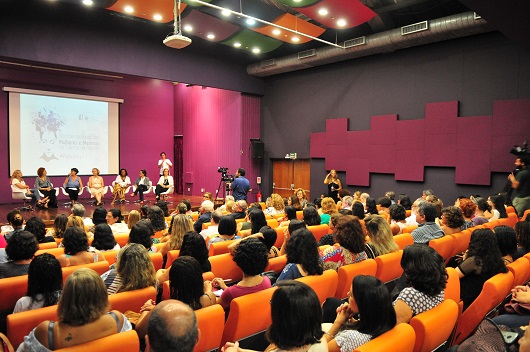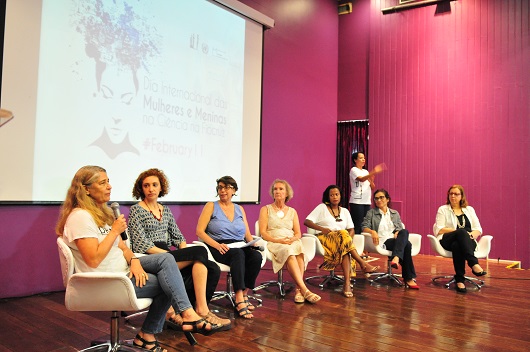International Day of Women and Girls in Science is celebrated at Fiocruz
15/02/2019
Julia Dias (AFN)
Despite being about half the population, women are still a minority in science. They are only 30% of the world's scientists and have received only 3% of Nobel Prize nominations in the scientific fields. In Brazil, only 14% of the members of the Brazilian Academy of Sciences are women. Considering this, the United Nations have established, in 2015, February 11 as the International Day of Women and Girls in Science, in line with the Sustainable Development Goals of the 2030 Agenda.

The day was established by the UN in 2015 and was celebrated for the first time at Fiocruz. Photo: Peter Ilicciev
The day was celebrated for the first time at Fiocruz with a panel in which women researchers of the Foundation talked about their scientific trajectories. Side events were also held in other units to mark the date.
"This day gave me a feeling of March 8, but with the focus on the scientific activity," said the president of Fiocruz, Nísia Trindade de Lima, the first woman to occupy the position. Nísia recalled women who pioneered in the institution, such as Maria Deane and Sylvia Hasselmann, and invited the participants to speak not only about their career’s achievements but also about the difficulties and challenges they have faced.
Inspirational Paths
Márcia Chame, Maria do Carmo Leal, Maria Elisabeth Lopes Moreira, Patrícia Brasil and Yara Traub-Cseko are today award-winning scientists and references in their areas of expertise. But they have come a long way to gaining recognition in their careers. The importance of role models and of scientific initiation grants, as well as meeting people who believe and support their dreams were among the components pointed by the scientists as determinants of their professional success.
The difficulties, however, persist. The PhD student and representative of the Fiocruz Postgraduate Association, Helena d'Anunciação de Oliveira, recalled some of the comments she has heard in her professional environment as a nurse. For being a largely female and care-related area, the profession is often stigmatized. "I've heard from a colleague that, as nurse, I had already a ready-to-use carnival costume. We are diminished daily in our work space and in our technoscientific capacity," said Helena.

For the female scientists, the important thing is to persist, despite of the difficulties. Photo: Peter Ilicciev
Despite the difficulties, scientists say the important thing is to persist. "I’ve been asked if I was discriminated. Certainly, but I did not notice. This is my advice: do not notice. Go ahead and do not waste time, because we have to focus”, said Maria do Carmo Leal of the National School of Public Health Sergio Arouca (Ensp/Fiocruz).
For Márcia Chame, researcher of the Institutional Program Biodiversity & Health, the important skills for her scientific activity came from another source, the sport. "In my case I did not have any scientific initiation during graduation, but I was an athlete and the sport taught me to lose, to persist, to repeat and to be rigorous," she said.
Maternity
The relationship of the academic life with motherhood was a point raised on in many of the talks. The requirement for productivity often ignores natural phases and processes of life, such as gestation and time for childcare, a burden that still fall back disproportionately upon women.
Recently, Fiocruz has taken initiatives to reduce this inequality, such as the inclusion of a clause in the Inova Fiocruz Knowledge Generation Call that considers gestation time and children in the curriculum lattes of female scientists and the creation of the Pro-Gender and Race Equity Committee in the Foundation.
The researchers argue that cultural change is also needed. "Men need to participate and play a more active role in paternity," said Yara Traub-Cseko, a senior researcher at the Oswaldo Cruz Institute (IOC/Fiocruz).

President of Fiocruz, Nísia Trindade de Lima, the first woman to occupy the position, recalled other women who pioneered the institution. Photo: Peter Ilicciev
"This is a discussion of the whole society and not just of women and girls," agreed the president of Fiocruz. "I come from a feminism that advocated a more feminine society, in the sense that the characteristics considered feminine, such as dialogue and care, are more valued by society. Science also needs to adapt to that."
Intersectionality
Racism and class issues have also been raised as important themes that affect the trajectory of many women. Being the first in the family to have a degree or a postgraduate degree is an achievement celebrated by some of the members of the panel, who have had to pave their own way.
"We need to talk about racism. In my childhood, I did not have many black people with a degree. Today I want to be able to be this role model for other girls, "said Mychelle Alves, a researcher at the National Institute for Quality Control in Health (INCQS/Fiocruz), who takes part at the Foundation's Gender and Race Pro-Equity Committee.
Mychelle is already this role model for many girls. In emotional testimony, the pharmacy student Ariela told how she fell in love with science when she joined Fiocruz's Scientific Vocational Program (Provoc), while still in high school. "My reference at the time was Marie Curie, but when I look at this table and study at this institution I see that my role models are much closer," she said.


